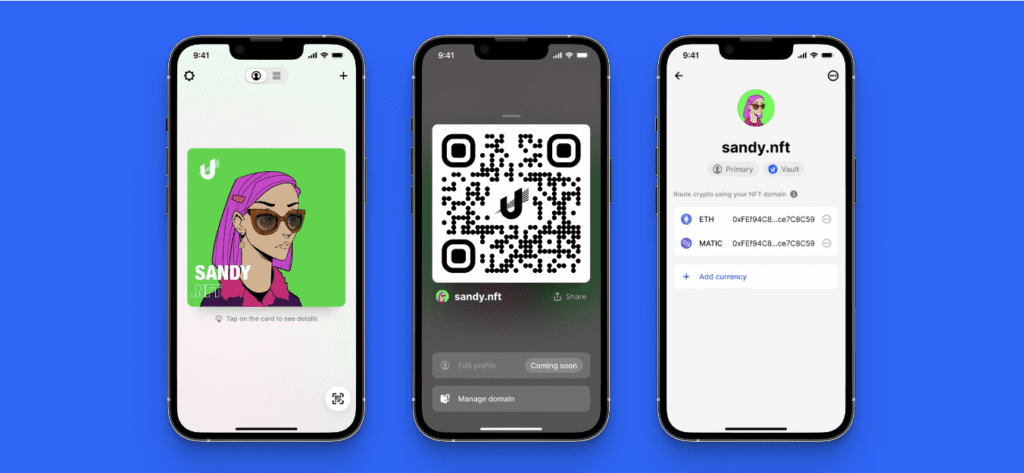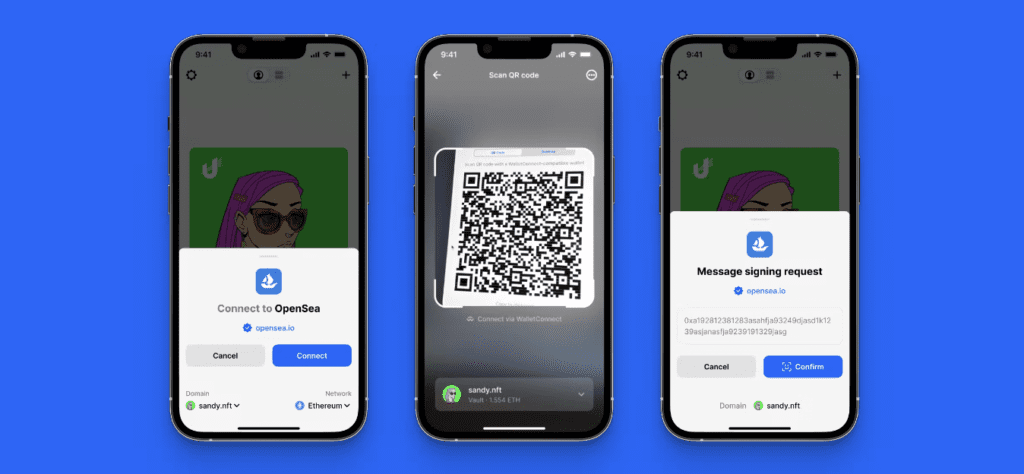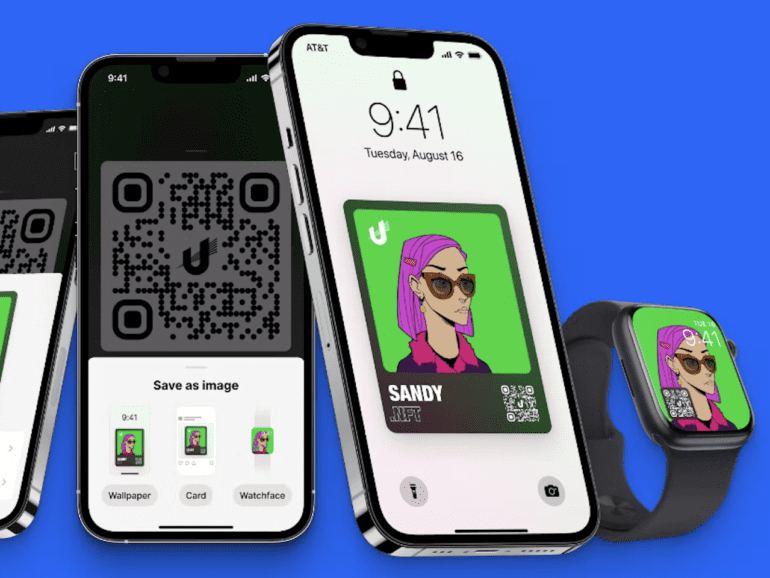One of the long-sustained challenges with Web3 and crypto technology is its accessibility.
With its strange jargon, bizarre access keys, pseudonyms, and wallet addresses made up of long streams of letters and numbers, the crypto world could be perceived as far away from our own. In a recent study by Crypto Literacy, it was found that 96% of Americans did not understand the essential elements of crypto technology.
However, as the world explores the application of blockchain technology, increasingly more use cases are being uncovered. The need for an accessible digital identity appealing to the masses has become critical to realizing many of these use cases.

“At Unstoppable Domains, we believe that owning a digital identity will help drive equity and privacy and empower billions of people around the world,” said Edward Nehamkin, Senior Product Manager for Mobile at Unstoppable Domains.
“We believe that in the future, NFT domains will become as ubiquitous as emails and give people an identity across Web3 that they can own and control. Our mission is to create a user-owned digital identity for every person on the planet.”
Unstoppable Domains recently launched their mobile app for iOS, which links the Web3 domains of over 180 dApps, metaverses, and games, as well as wallets such as MetaMask and LedgerLive.
“Our mobile app plays a really important role in helping us realize that vision and making digital identity more accessible to users,” he said.
Digital identity becoming critical.
Digital adoption is well and truly on its way. Studies say that 65% of the world’s GDP is predicted to be digitized by 2022, with 70% of organizations looking at a digital strategy.
Tied into increased digitalization is data and, with it, identity.
“As more things become digital,” said Nehamkin, “I think that your name and reputation online, how your data is managed, and how users can connect and interact with that information will really change the general landscape of how users interact with different services.”
A survey conducted by the EU found that 72% of users want to know how their data is processed when they use social media accounts, while 63% of EU citizens want a secure single digital ID for all online services.
“I think that a lot of companies and applications are starting to see that privacy and security are top of mind in today’s day and age. I think it enables businesses to build a lot of trust with their users when a user can connect to their application and know that they have control over their personal information and it isn’t going to be sold.”
For many, a secure digital identity is a key to ensuring control of their data. The move to Web3, with the increased transparency, security, and individual anonymity of the crypto world, has made the need for digital identities critical.
“Being in full control over your data really falls close in line with one of our primary missions,” he continued. “We want to give users an accessible way to connect to applications and control the data they share about themselves while also having a safe place where they can manage all their personal information without exposing it to third parties.”
“I think we’ll see this trend where more apps will transition to supporting self-sovereign identity and offer incentives to users to share certain pieces of information to encourage loyalty. It also gives these institutions and platforms the ability to collect updated information consistently.”

The Unstoppable Domains app
According to DataReportal, the average adult in a global context spends over seven hours a day looking at a screen, around 44% of their waking hours, much of this connected to the internet. This is split into over three and a half hours at their desktop and just under four hours at their mobile. Many may consider themselves to be above average using these figures.
“The key areas we’re focusing on are ownership, privacy, reputation, and accessibility,” said Nehamkin. “So we believe mobile will play a huge role in general adoption, utility, and interaction with different applications.”
Unstoppable Domains isn’t new to the area of digital identity and has already built a reputation for facilitating the creation of Web3 domains. The mobile app aims to improve accessibility for the mainstream.
“For us, the Unstoppable Domains app plays an important role in building the foundation for self-sovereign identity within Web3. It addresses the user experience. Transitioning to a human-readable format that is accessible and secure, through a mobile experience, I think is important for Web3 adoption.”
He explained the app aims to onboard even the most novice Web3 user while retaining utility for users with more experience.
“We believe that our kind of onboarding flow really addresses a lot of the pain points with kind of getting set up with managing domains. We introduce users to the concept of domain vaults, how you actually store and protect your domains, and how you can utilize them.”
Users can buy domains via the app, manage them, create online profiles and build decentralized websites. They can also choose how they interact with the domains, setting up wallets within the app or connecting them to external wallets. They also can use the Unstoppable app account as a single login to other dApps via the “Log in with Unstoppable” facility.
“On connecting, users are asked if they want to share their email, if they want to share their social links and if they want to share their wallet address, among other things. So the user can opt-in to sharing certain pieces of information that they want to versus not sharing,” Nehamkin explained.
“Different applications can also create different types of experience for users based on the information they want to collect. Maybe they can offer discounts, and loyalty rewards, for sharing certain pieces of information. It can create new types of experiences.”
All data has the option of being backed up on the cloud, protecting from loss or theft of the mobile device, and login can be programmed to work with a face or touch ID.
“We’re also exploring new ways to backup your domains and prevent loss,” he continued. “People losing funds in crypto is one of the biggest problems. Losing your private keys yourself is more of a problem than getting hacked. So we want to give users new ways to backup and prevent loss through additional redundancy measures.”

This is just the beginning
So far, the app has had 25,000 downloads since the release of its iOS app in mid-August. Nehamkin explained that their next step is releasing the app for Android. However, they have plans to continue the development of the features to make Web3 more accessible.
“Reverse resolution is probably one of the biggest features we are working on,” he said. “That process enables applications to turn your wallet address into a human-readable name. When you connect to any application with a wallet, it will display your wallet address, and reverse resolution enables that application to recognize that this wallet address is your domain name. So we’re allowing users to set that up within the mobile app.”
This feature could aid in building the user’s reputation, whether it be pseudonymously or with their real name.
“We’re also working on functionality pertaining to managing profiles. Currently, users on our website can manage their social links, location, and bio. They can use a humanity check and add an email. We want to bring a lot of those features onto the mobile app and make it the most accessible and easy way to manage your digital identity on the go.”
“As well as the interaction with apps and data sharing options, that portability aspect, I think will be a true game changer.”


